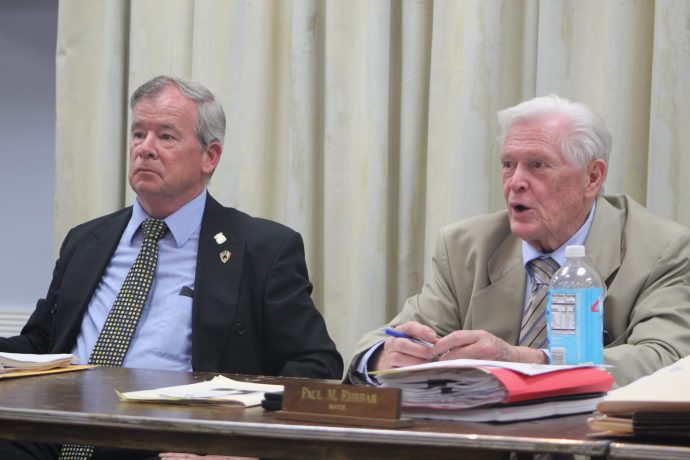After hearing strong pushback from residents, the Williston Park Board of Trustees voted not to enter a lease agreement with AT&T that would have permitted telecommunications equipment to be installed atop a water tower.
By unanimous vote, the trustees declined to enter the proposed lease. At a public meeting Monday evening, Mayor Paul Ehrbar read a statement to residents, who applauded after hearing the board’s decision.
“Considering all the legal arguments and interests involved, the village board determined that leasing a portion of village property to AT&T for the purpose of erecting a wireless telecommunications facility is not in the best interest of the village,” Ehrbar said.
Before voting, Ehrbar described the village’s obligations under federal and state law on leasing public property to private enterprises. Ehrbar also spoke of FCC regulations on applications of telecommunications carriers for special use permits.
“On the advice of our village attorney, that decision meant that AT&T did not have my notice of consent, that AT&T did not have legal standing to bring this application for a special use permit and the related remaining portions of the application,” Ehrbar said. “The application had to be dismissed and determined to be denied on that ground.”
When trustees were asked if AT&T could file a lawsuit, the village attorney, James Bradley, advised them not to answer that question.
When asked if a carrier could operate a cell tower on private property, Ehrbar said that is almost impossible to prevent.
In the same resolution that denied AT&T’s application, the village adopted a negative declaration under the State Environmental Quality Review Act, affirming that the proposal would not have had an adverse effect on the environment. This comes after arguments by the company’s legal representative at a public hearing last May indicated a limit in the scope of the trustees’ decision.
“The municipality cannot deny the application for health and safety reasons if the telecommunications application is in compliance with FCC requirements,” said Anna Mercado Clark, a partner at Phillips Lytle LLP. “We want to be a good partner to the village, but the FCC sets the regulation and as long as we can be in compliance the board does not have authority to deny the application.”
Dan Penesso, a radio frequency engineer for the telecommunications company, testified at the May meeting that the installed equipment would emit electromagnetic energy on the ground at a level of 0.05%. FCC compliance is allowed up to 100%.
Clark added that the type of technology to be installed would stay within safe exposure levels for humans and that the conservative nature of her client’s calculations could mean frequency levels operating less than what is projected.
“FCC has recently as of December of 2019 reevaluated its safe exposure levels and reaffirmed those safe exposure levels and those are the levels we use for our calculations,” Clark said. “The American Cancer Society has also abided that this type of technology as Dan mentioned is non-ionizing which means it does not have the capability to modify human cells.”
AT&T was prepared to sign the lease in its written form along with a $50,000 bonus, according to Clark. Now that it has been rejected, the village of Williston Park loses out on collecting rent at $5,000 per month subject to a 3% escalator for five years, along with five renewal terms. Over 30 years, AT&T representatives claimed the village could have collected nearly $2.854 million.
Even so, some residents who attended Monday evening’s vote felt relieved, even thanking the trustees for their decision.
“Even though we follow the [FCC] guidelines and we concur to them, we as a village and you as leaders have a responsibility to take it a step further,” Williston Park resident Linda Piccirilli said. “You showed that recently by not voting for it.”

